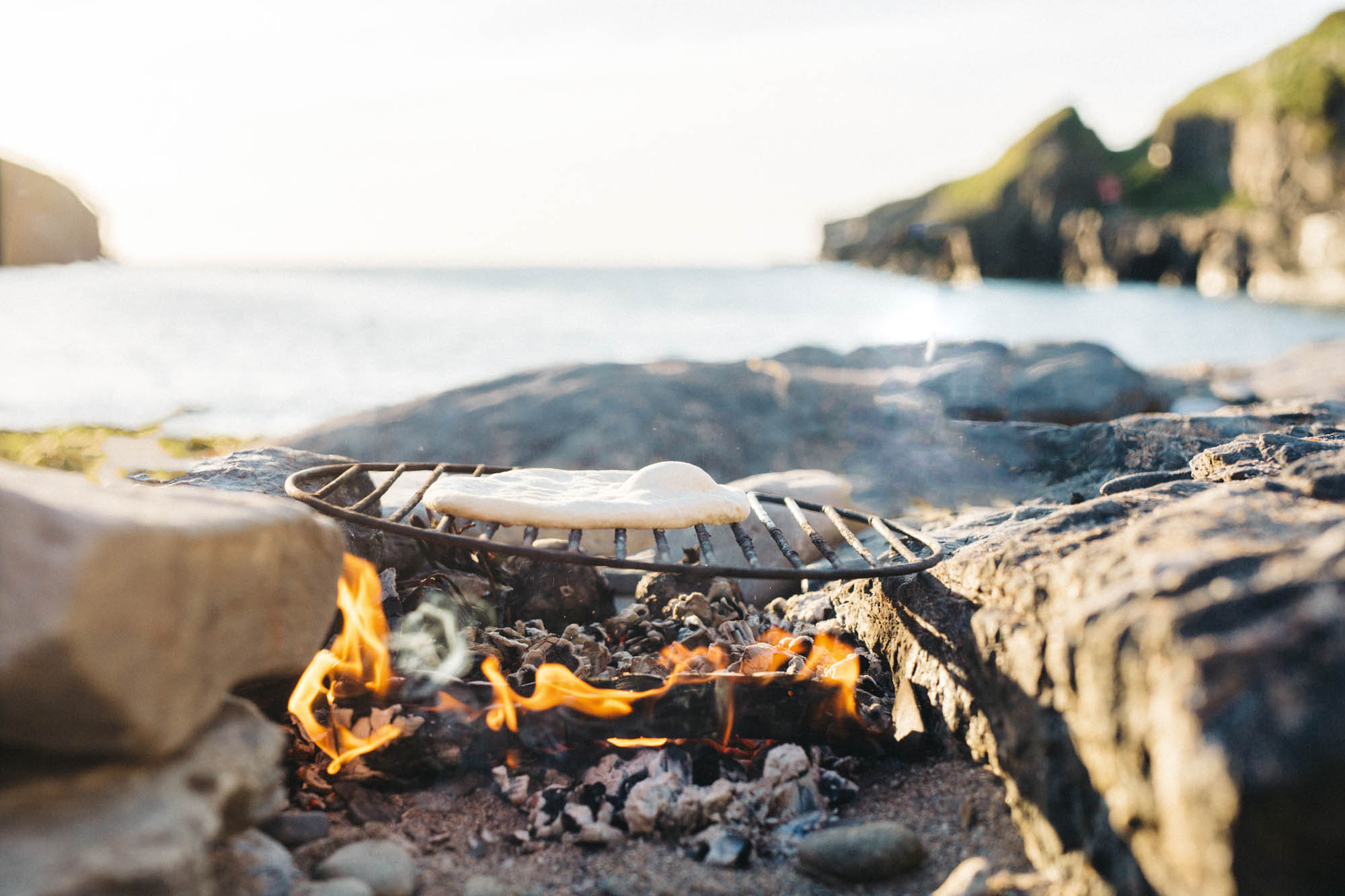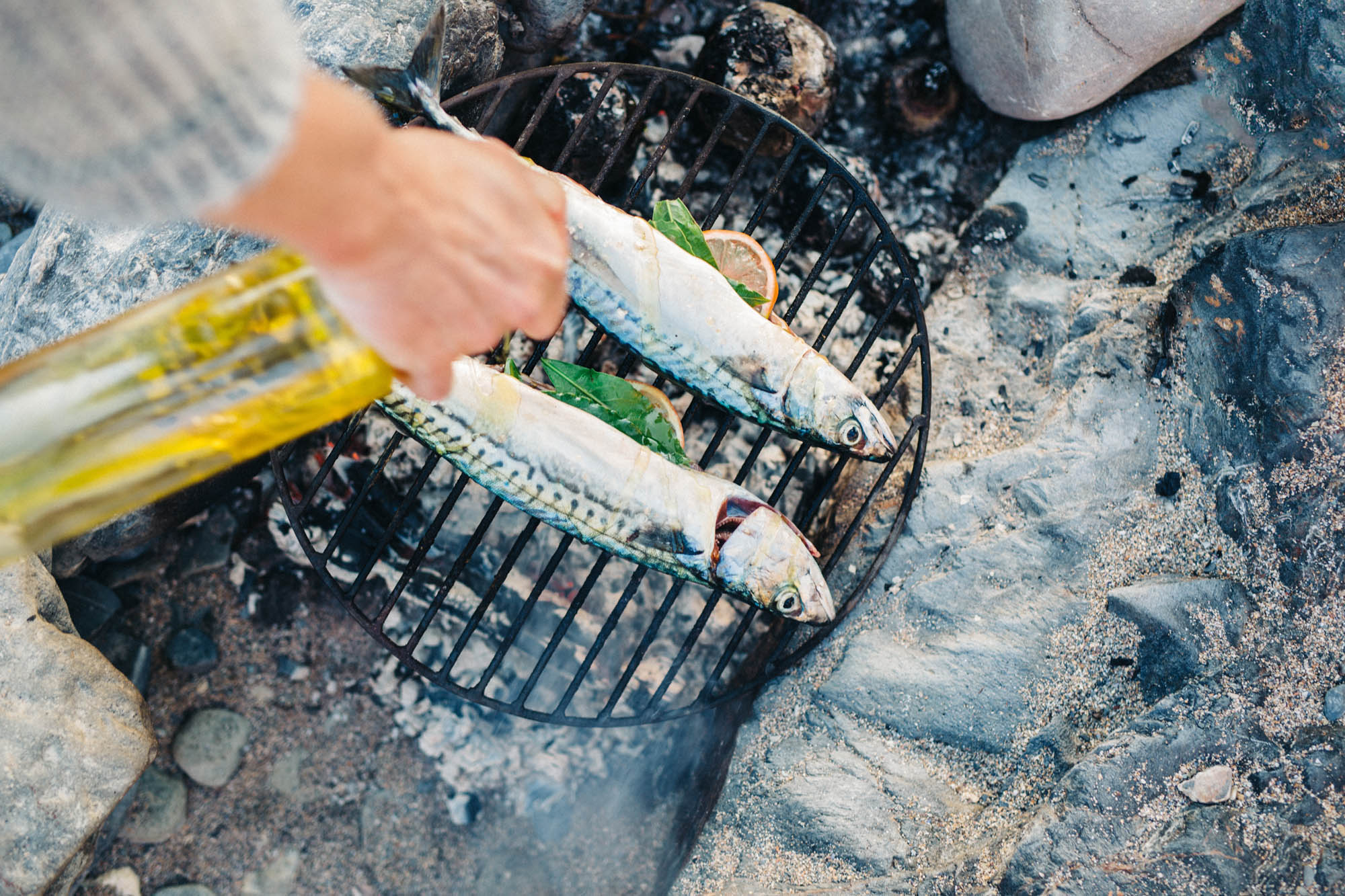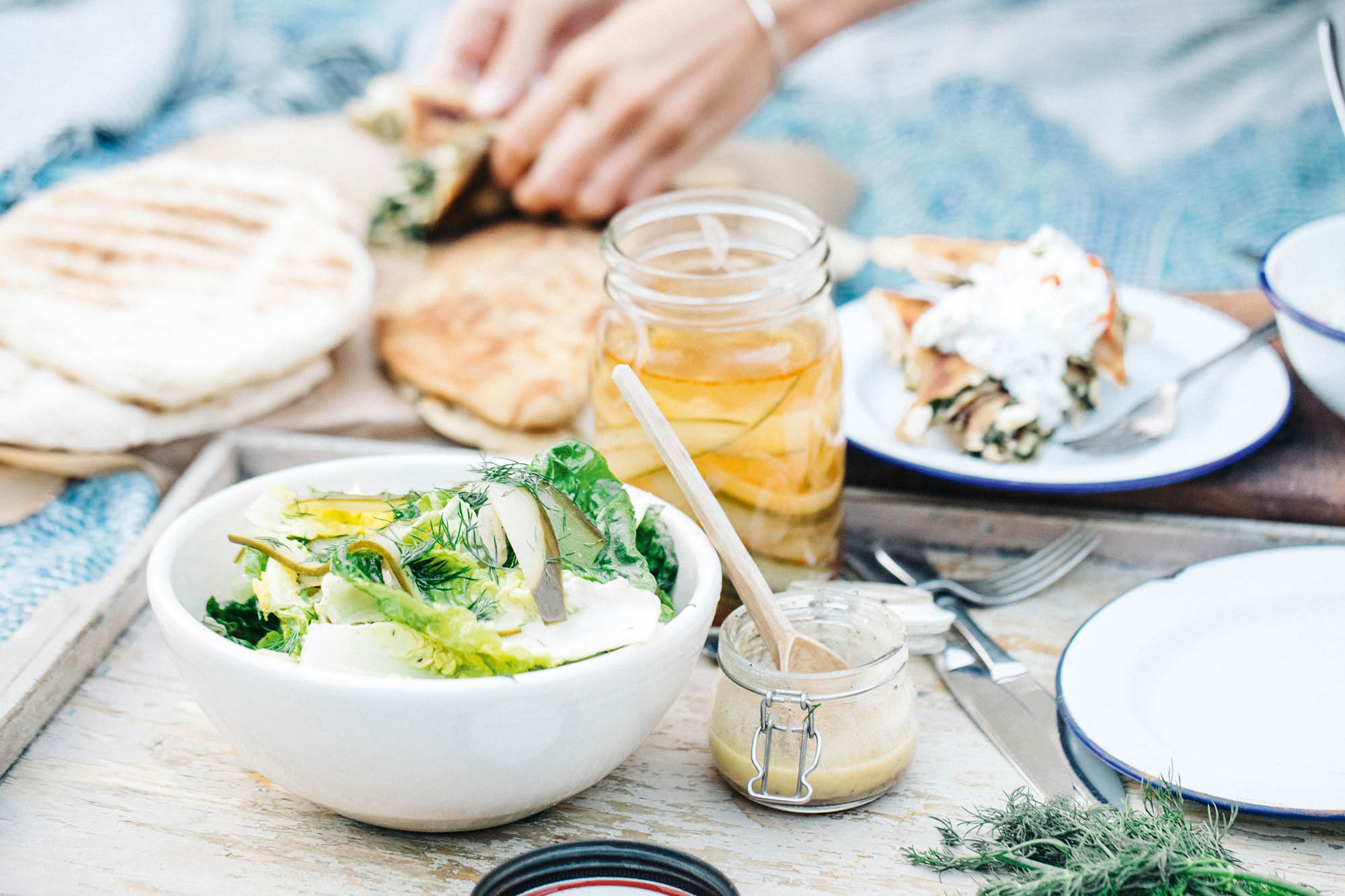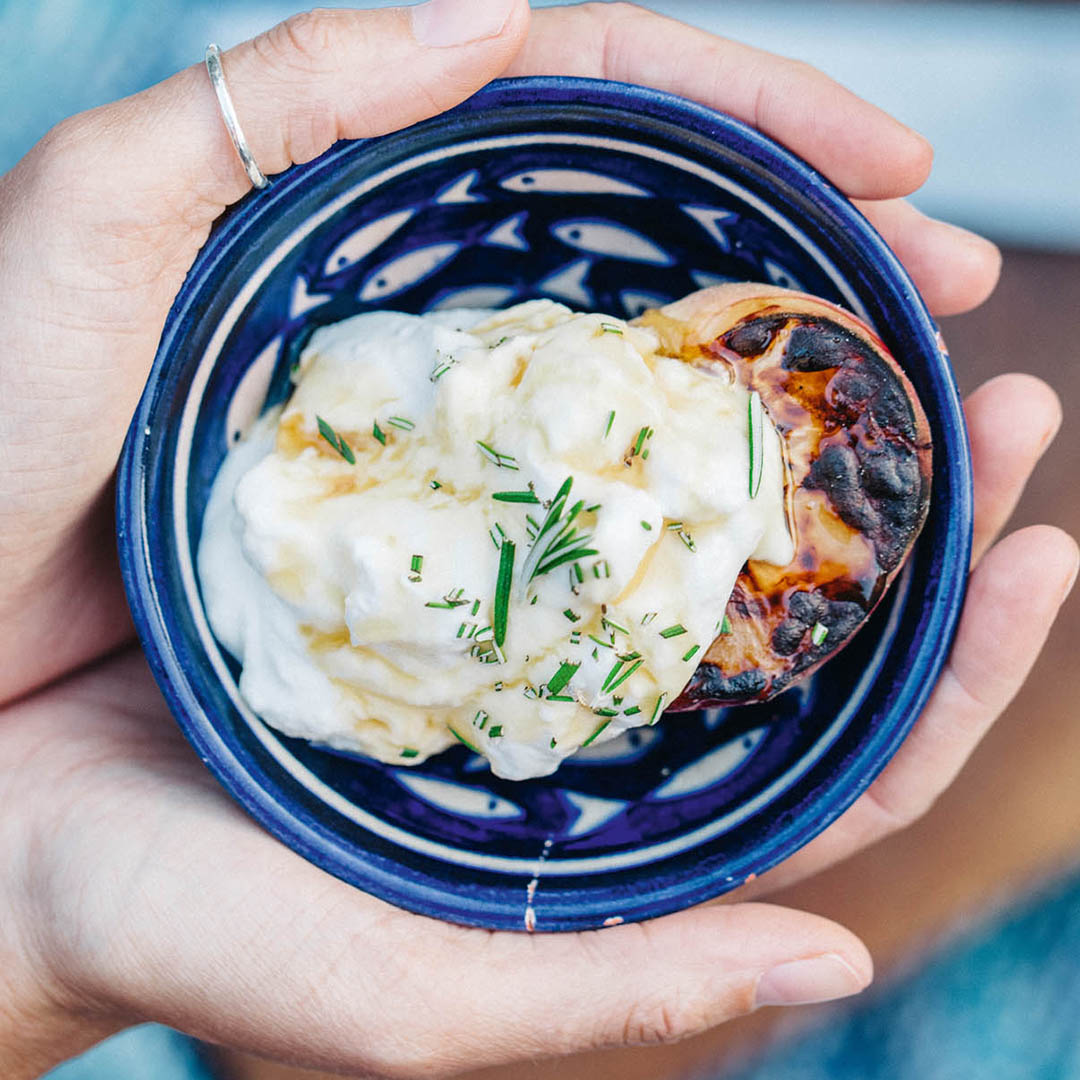Best beach barbecue recipes — and four golden rules for cooking at the beach
Everything tastes better when it's cooked outdoors, and even more so when it's on the beach. Award-winning food writer Jack Adair Bevan shares his best beach barbecue recipes; photos shot for Country Life on location in Port Gaverne, Cornwall by Benjamin Pryor.

Cooking on the beach is one of my favourite ways to spend an evening, ideally next to a bottle of crisp white wine cooling in a bucket of seawater.
On a chance encounter with a fisherman, on the west coast of Scotland, I swapped cold beers for big brown crabs, our boats bumping gunwale to gunwale. The crab found its way onto our plates that evening; boiled over white-hot coals, eaten with a baguette, mayonnaise and lemon. Another time, nestled in the lee of a granite cliff, I cooked new potatoes in seawater, rolled them in butter and black pepper and devoured them straight from the pan. Food, fire and sea is surely one of the best ways in which to connect with the elements.
That’s not to say that there haven’t been any disasters. Once, there was a miscommunication over ingredients and we were left with a meal consisting of four litres of hummus, four bags of crisps and eight packs of Cumberland sausages. We all forgot the bread.
With that in mind, here are some expert tips from Genevieve Taylor and Simon Stallard.
Four rules for barbecuing at the beach
1. Prepare everything in advance
According to fire chief Genevieve Taylor of Bristol Fire School, it is all about the ‘prep, prep, prep!’. She suggests ‘trying to do as much as you can before you arrive at the beach and keeping it simple.
2. Don't cook on driftwood you might find on the beach
It may well contain harmful chemicals’. Instead: ‘Take a decent bag of well-made British charcoal, because it’s light and the best option for cooking,’ says Genevieve.
3. Try to barbecue below the high tide waterline
Simon Stallard, owner and chef of the Hidden Hut in Cornwall, adds: ‘Pick a spot to cook below the tideline. After you have cleared any rubbish, the sea will wash away any trace of the fire.
Exquisite houses, the beauty of Nature, and how to get the most from your life, straight to your inbox.
4. Check you have everything before you light the fire
Check the wind direction and strength before you commit and remember to take these three essential items, pocket knife, tongs and something to wipe your hands with, especially if cooking raw meat and fish.’
With these golden rules and tips ringing in my ears, I’ve put together a few recipes (each one serves four people) for you to try the next time you feel the urge to cook on the beach.
Flatbreads
Ingredients
- 450g strong white organic flour, plus a little extra
- 1tspn fine sea salt
- ½tspn dried yeast
- ½tspn sugar
- 300ml warm water
- 2tbspn olive oil
Method
Make the dough an hour or two before you head to the beach. Add the flour and salt to a large mixing bowl. Dissolve the yeast and sugar in the warm water, then pour slowly into the flour mixture, stirring as you go.
Once all of the water has been incorporated, add the olive oil and continue to knead.
Move the dough to a floured surface and keep kneading for a further five minutes, adding more flour if it feels too sticky. The dough should start to take on a smooth, elastic character. As soon as you’re happy with the texture, cover with a clean tea towel and leave to rise for about an hour.
About 15 minutes before you plan to cook your flatbreads, divide the dough in half. Reserve half for the gözleme (below); divide the other half into four flat circular shapes, rolling them into shape on a well-floured surface (remember to take some extra flour and a suitable board to the beach with you).
Cook them directly on the hot wire grill and when they begin to billow up and bubble, flip to cook through on the other side. You can wrap the flatbreads in a clean tea towel to ensure that they stay warm and soft.
Gözleme (Turkish-stuffed flatbreads)
This is a great recipe for using up any greens you might have hiding in the fridge. You could also try adding young nettle tops or wild garlic in season.
Ingredients
- 100g spinach or chard leaves, stalks removed
- 50g wild rocket, wild garlic or young nettle tops
- 25g spring onions
- Olive oil
- ½tspn ground allspice
- Flatbread dough (above)
- 200g feta cheese, crumbled
- 40g unsalted butter
Method
Before you head to the beach, wash all the leaves and spring onions. Finely slice the spring onions, and then cook slowly over a low heat with a splash of olive oil and the leaves until wilted. Leave the mixture to cool before adding all of the spices and crumbled feta, mixing until evenly dispersed. Pack inside a well-sealed container and pop in your picnic basket until later.
Ready to eat? Take the remaining half of your flatbread dough and divide into four round balls, rolling each one out on a floured board as thinly as possible. Spread your pre-prepared filling across each of the four thin discs of dough, leaving a 2in border around the edge. Lightly wet the edges, before folding each bit of dough in half, pinching the edges firmly as you go to make large, half-moon turnovers. Think Cornish pasty and you’re basically there!
Set a cast-iron frying pan on the fire with a good dollop of butter and cook two of the gözleme at a time, on both sides, until golden brown.
Serve with garlic and herb yoghurt (below).
Barbecued mackerel
Ingredients
- 4 fresh mackerel
- 8 thin slices of orange
- 2 handfuls of fresh bay leaves
- Olive oil
- Sea salt
- Black pepper

Method
Gut the mackerel and rinse well with cold water. Pat dry with kitchen paper, season inside and outside with the salt and pepper and drizzle all over with a little olive oil.
Stuff each fish with a few of the bay leaves and two slices of orange.
Heat your wire grill over the hot coals before carefully laying the mackerel on top of it. Cook for five minutes before turning over — try not to break the fish apart — and repeat until ready the whole way through.
Serve immediately.
Herby garlic yoghurt
Ingredients
- 200ml organic Greek yoghurt
- 2 cloves of garlic, crushed
- Zest and juice of half a lemon
- 1 chilli, finely chopped
- A handful of coriander, mint and parsley, chopped
Method
Combine all of the ingredients together, mix and transfer to a well-sealed container.

Pickled cucumber
Ingredients
- 1 cucumber, cut into ribbons
- 1 shallot, finely sliced
- 200ml of white wine vinegar
- 200ml of water
- 1tspn of fennel seeds
- ½tspn of chilli flakes
- 50g of sugar
- ½tspn sea salt
Method
Combine your cucumber ribbons and salt, mix well and leave to stand for 30 minutes.
Dissolve the sugar in the vinegar and water by warming over a gentle heat. Add the fennel and chilli flakes, remove from the heat and leave to cool.
Drain any liquid that’s accumulated on the cucumbers and brush off any remaining salt. Then, transfer to a jar or suitable container and cover with the now cool, sugary liquid.
Place in the fridge for a minimum of a few hours — ideally overnight — until you’re ready to use. Serve with some baby gem lettuce, finely chopped dill and French dressing.
Grilled peaches with ricotta and honey
Ingredients
- 4 ripe peaches, halved
- 150g ricotta cheese
- 1tbspn raw honey
- Sprig of fresh rosemary, chopped

Method
Place the peaches on your portable beach grill, cut side down, and barbecue until they have char lines — which should take about five minutes. Carefully turn them over and barbecue for a further five minutes until they are soft all the way through.
Once ready, place a generous spoonful of ricotta on the peaches, drizzle with honey and season with rosemary. Eat immediately.

Rosie and Jim: The 10 rules of throwing the perfect beach picnic (N.B. You're going to need a unicorn)
This week, Rosie shares a series of tips which in now way reflect bitter personal experiences, while James reminds us
Country Life is unlike any other magazine: the only glossy weekly on the newsstand and the only magazine that has been guest-edited by His Majesty The King not once, but twice. It is a celebration of modern rural life and all its diverse joys and pleasures — that was first published in Queen Victoria's Diamond Jubilee year. Our eclectic mixture of witty and informative content — from the most up-to-date property news and commentary and a coveted glimpse inside some of the UK's best houses and gardens, to gardening, the arts and interior design, written by experts in their field — still cannot be found in print or online, anywhere else.
